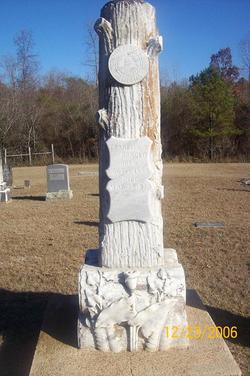Franklin Smith Arnold was born October 8, 1855 near Saratoga, Arkansas (Hempstead County) His parents were Thomas B. Arnold and Mary Smith (daughter of Nathan D. Smith and Elvira Stowe) He lived with his mother and grandfather (Dr. Nathan D. Smith) during the civil war. After his father returned, his family moved to the Deann community where he grew up. He married Julia Graves September 28, 1881. They had two children but he lost his wife and both children in less than six months. He lived with his Aunt and Uncle John Mulkey for about four years. He then married Julia Ellen Holcombe They had nine children but four died in early childhood. Frank built a fine house for the family. The living and kitchen area was separated from the bedrooms by an open hall or breezeway. (Mary called it a gallary) He united with the Bluff Springs Church about the time of his marriage to Julia. He was a member of Woodmen of the World. He was a very active member of the church and served as Sunday School Superintendent. He was elected to the school board about 1897 and worked hard and persistently for a better school and community. He was appointed road overseer and was responsible for getting the roads surveyed and some tax money for road improvement. He insisted that men of the community pay road taxes or perform the necessary road work. This caused some resentment and bitterness. They managed to get the Hickory Grove School for Negroes authorized and established. He was a central figure in controversies associated with what was called the saloon problem. Feelings ran so high that some men of the community wanted to dynamite all the saloons but Frank insisted that opposition activities be legal. He was stricken with Typhoid Fever and died at the early age of 54. A large crowd came to his funeral including family, church members, community friends, Woodmen of the World and railroad crew members. Several negroes also came to the burial.
Mary Arnold, their oldest daughter related many events of their family life such as: The entire family would go to church by wagon; Decoration Day activities; Dinner on the ground at church; Church camp meetings; Greeting new families to the community; Neighbors helping each other at harvest and hog killing time; Community raising a barn or house; Visiting or caring for the sick, etc.
Franklin Smith Arnold was born October 8, 1855 near Saratoga, Arkansas (Hempstead County) His parents were Thomas B. Arnold and Mary Smith (daughter of Nathan D. Smith and Elvira Stowe) He lived with his mother and grandfather (Dr. Nathan D. Smith) during the civil war. After his father returned, his family moved to the Deann community where he grew up. He married Julia Graves September 28, 1881. They had two children but he lost his wife and both children in less than six months. He lived with his Aunt and Uncle John Mulkey for about four years. He then married Julia Ellen Holcombe They had nine children but four died in early childhood. Frank built a fine house for the family. The living and kitchen area was separated from the bedrooms by an open hall or breezeway. (Mary called it a gallary) He united with the Bluff Springs Church about the time of his marriage to Julia. He was a member of Woodmen of the World. He was a very active member of the church and served as Sunday School Superintendent. He was elected to the school board about 1897 and worked hard and persistently for a better school and community. He was appointed road overseer and was responsible for getting the roads surveyed and some tax money for road improvement. He insisted that men of the community pay road taxes or perform the necessary road work. This caused some resentment and bitterness. They managed to get the Hickory Grove School for Negroes authorized and established. He was a central figure in controversies associated with what was called the saloon problem. Feelings ran so high that some men of the community wanted to dynamite all the saloons but Frank insisted that opposition activities be legal. He was stricken with Typhoid Fever and died at the early age of 54. A large crowd came to his funeral including family, church members, community friends, Woodmen of the World and railroad crew members. Several negroes also came to the burial.
Mary Arnold, their oldest daughter related many events of their family life such as: The entire family would go to church by wagon; Decoration Day activities; Dinner on the ground at church; Church camp meetings; Greeting new families to the community; Neighbors helping each other at harvest and hog killing time; Community raising a barn or house; Visiting or caring for the sick, etc.
Family Members
-
Clara Elvira Arnold
1888–1890
-
![]()
Mary Florence Arnold Roberts
1890–1968
-
![]()
Lelia Ethel Arnold McBay
1892–1984
-
![]()
Bertha Ellen Arnold Garner
1895–1980
-
![]()
Pearl Arnold Green
1897–1969
-
Lewis Franklin Arnold
1898–1901
-
![]()
Ida B Arnold Edwards
1901–1985
-
![]()
Walton Herbert Arnold
1903–1961
-
Andrew Hunter Arnold
1907–1908
-
Annie Ozelle Arnold
1909–1913
Sponsored by Ancestry
Advertisement
Advertisement















